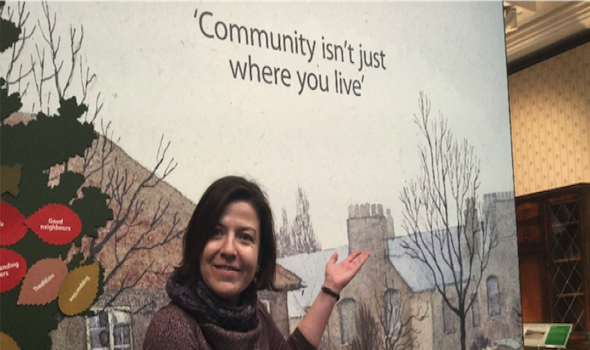Magdalena Kot's Story
Magdalena Kot's Story

All the changes - political, social, cultural - started to happen after 1989. I went from black and white film into colour. So many opportunities started to open.
Before 1989, we had very little knowledge about what's going on outside the Russian bloc. When the Berlin wall broke down I was 15. Before, I didn't feel that we were lacking anything; it was a very nice simple comfortable life. We were not thinking about going to the UK, not thinking in terms of “it's not allowed” - it was just a non-existent thing. Then in 2004 when Poland joined the European Union, so many people came to UK: they wanted to come finding new job experience.
My cousin was doing her degree in English Language so she started to come to the UK in the summer and work in pubs. My boss then was closing whole company down, so I thought – oh, maybe I can go to the UK for a year, year and a half, see how it is. Within two months I found myself in the UK.
At first it wasn't as perfect as I thought it would be, there were a few hiccups. I went through a language shock purely because of the accent of the North, so I watched all the soap operas. Later, thinking about that period of time, I think I sorted everything very calmly, very methodically, I wasn't really stressing though I had to change accommodation and jobs. I started attending English evening classes in Sheffield. It was intense but very amiable, very funny. It was the most amazing class, it gave me so much confidence. Within the group were diverse students having the same problems: we could help each other with other aspects - accommodation, documentation, applications.
I worked within the Care Home environment, but I was a qualified dietitian from Poland and I wanted to pursue my career. At first I was not able to because you need to be registered with the Health Care Professionals Council. That was the next step. I came to Birmingham and started as a dietetic assistant and after couple of years I became Assistant Practitioner. Finally I became registered so now I am in a position to look for dietetic jobs.
In Poland dietetics was purely about catering, creating menus but UK dietetics is more clinical, it's much more developed and professional. It's versatile, interesting - it's what I love to do and I want to develop. I would like to work within diabetes and weight management, those are the jobs where you can be close to the communities, close to the patients, helping them to manage their condition, to see options that they've got - you help them to make their own care plan. Also I'm very interested in eating disorders so it involves coaching as well.
The hardest thing is isolation. If you don't have friends then sometimes you can get very, very low, so it's important to create your own network of contacts. It's also important to be in touch with your friends in Poland and your family, just to keep you going. Ultimately you have to think about your goal: why you are here. Your heart may tell you you want to be here – and also that you want to be with your family - but you can only be in one place at a time.
The other thing that was particularly difficult for me was the bad press the Polish people had. Because of your accent you will be asked “oh, where are you from?” - even from my patients. You are so fearful to say that you are Polish, because you don't know what that person's perception of Polish people would be. You may get “oh, that's nice, oh I've got friends from Poland, yes, my son got married 5 months ago to a Polish girl, how lovely” - but you are still afraid that there will be something not really nice. I value the diversity of Birmingham especially. Recently there was a project on getting food recipes from different cultures. Seeing someone from the Polish community giving a recipe for their favourite foods alongside an Indian lady – it is very nice if you see all these different cultures valued together.
View Magdalena Kot's? video here: https://www.youtube.com/watch?v=qw1_7HMqbr0
This interview is part of a series of stories of migrants in Birmingham produced by participants of Migrant Voice's 'Many Faces, One City' project. The project celebrates the contribution of migrants to life in Birmingham. It brought together migrants and host community in Birmingham to build their skills in telling stories of migration through text, photo, film and social media.
Funded by Big Lottery – Awards for All, England.


